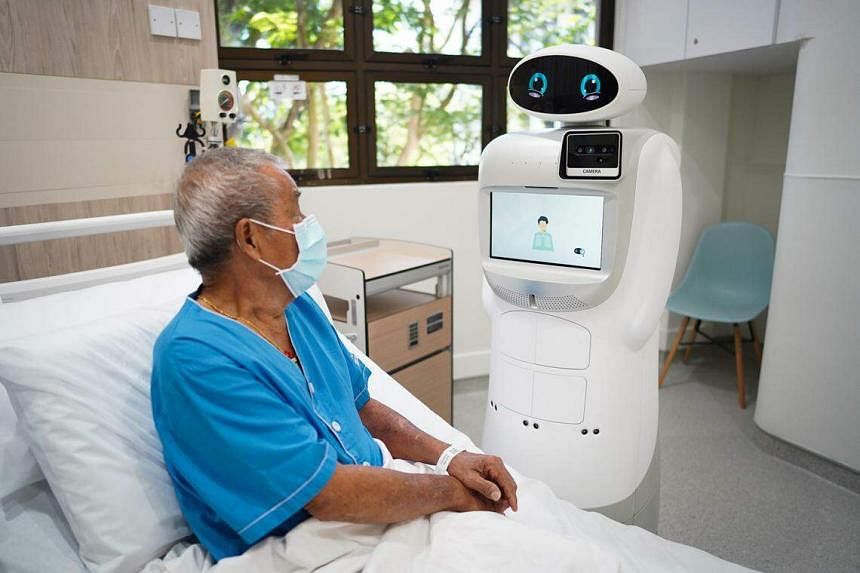Happier workers and better care for seniors? AI can improve life in Singapore
Artificial intelligence can help improve jobs and ageing if we can manage the risks, maximise the benefits and distribute the surplus.

Artificial Intelligence (AI) is no longer a futuristic concept. It is a present reality reshaping our world profoundly.
Recent advances have generated a mix of apprehension and excitement among industry experts, policymakers and the public. Industry leaders like Microsoft’s founder Bill Gates believe that AI can help tackle some of humanity’s biggest challenges, such as climate change and public health. Conversely, AI pioneer Geoffrey Hinton and others warn of potential dangers, including the spread of disinformation and threats to privacy.
The tasks facing governments and societies are threefold: First, how can we manage the risks of the new technology and help workers stay relevant? Second, how can we mobilise AI to tackle the most pressing challenges we face today? Finally, how should we distribute the surplus value created by AI in a fair and equitable way?
These interconnected challenges must be addressed satisfactorily if AI is to fulfil its potential and bring net benefit to society. Considering these issues in the context of jobs and population ageing, two crucial challenges facing Singapore over the next decade, can yield insights into how AI may be marshalled for the collective good in more areas.
Preparing for changing job roles
AI will create winners and losers as it transforms jobs and industries. Educators and policymakers must focus on helping students and workers harness the many uses of AI to be more productive and create greater value, so that more Singaporeans end up as winners rather than losers from the AI revolution.
This must be a continuous effort. Even AI-derived salary premiums may be transient, as successive improvements in AI further reduce the involvement of “humans-in-the-loop”.
This will also require education and training to focus on cultivating broader skills like agility, adaptability and resilience. We have to accept that few technical competencies will be of permanent value as AI advances; hence, continual retraining and innovation will be key to helping workers stay relevant.
AI will have indirect, longer-term implications in reshaping work as we know it. Its influence will be far-reaching as it steadily brings down the cost of automating work processes. Over time, AI-enabled automation will become sufficiently cost-effective to displace humans in an increasing number of tasks and domains – meaning fewer professional jobs within certain industries – and compel workers to seek opportunities in sectors less prone to automation, such as healthcare and personal services.
A consequent policy challenge is to help workers make smoother career transitions, including major ones. The Singapore Government’s plan to introduce “re-employment support” to provide a temporary financial cushion for displaced workers can play a vital part in helping people bounce back from job losses arising from new technology.
It is also critical to make every job a good job – including in domestic services, which is likely to form an increasingly important source of employment for Singaporeans. This will entail better wages and job redesign to make such jobs more rewarding and appealing to local workers.
Enhancing job satisfaction
But all is not doom and gloom. Along with risk, there is also opportunity in companies’ drive to incorporate AI into their business operations. AI can help alleviate work stress and burnout, a key concern given voice by the global trend of “quiet quitting” and “lying flat”.
Here, a deliberate approach is needed. Organisations should identify their employees’ most monotonous tasks, and identify, procure and deploy suitable AI solutions to relieve the burden.
Such tasks may include filling in standard forms, performing audit checks, or responding to common customer queries. Targets can be set for cutting workload and time spent on such tasks.
Doing so can rid workers of tedium and help them focus on more engaging work that requires deeper analysis, creativity or a human touch, such as fostering relationships with stakeholders.
The benefits of such an approach extend beyond the workplace. Happier, less stressed workers can lead to improvements in mental health, better life satisfaction, and stronger interpersonal relationships.
Supporting seniors and caregivers in an ageing society
AI can also help to address challenges relating to ageing as Singapore’s population greys.
First, AI can support caregivers by taking over routine tasks such as scheduling doctor visits, or providing reminders to seniors suffering from dementia. Caregivers can then devote more time to empathetic conversations, providing the human touch which AI cannot replicate. Manpower resources freed up by AI and automation can then be redeployed within the care sector.
Second, home safety and comfort for frail seniors living by themselves may also benefit from the integration of AI with sensors and the Internet of Things. AI can help identify regular or trusted visitors to the home, provide alerts to seniors when the floor is wet and slippery, or detect and turn off appliances not in use.
Third, AI can also give a boost to telemedicine in various ways such as monitoring seniors’ health, performing predictive analytics tailored to the individual, and helping patients comply with medical guidance. All these can improve patient outcomes and manage the demands on the healthcare system as the population ages.
Fourth, AI can help bridge the “digital divide” by making it easier and more intuitive for less technologically inclined seniors to use smart devices for day-to-day tasks. For instance, AI can enable them to give voice instructions in natural language rather than having them navigate apps to perform tasks such as ordering food and household supplies, making financial transactions, tapping government e-services and connecting with loved ones.
Combating disinformation and scams in the digital age
The possibilities that AI presents in addressing employment and ageing suggest its vast potential in other domains.
While there are concerns that AI may fuel the spread of disinformation and scams, these are the very challenges of the digital age which AI should be mobilised to tackle.
AI tools can be deployed to help users distinguish fact from fiction and be alert to bias in information feeds. AI cannot substitute individual judgment and discernment, but can play a part in raising awareness of potential bias and intention to mislead. For example, Google will be introducing a feature called “About this image” to help people quickly and easily assess the context and credibility of images that they may suspect to be AI-generated.
Already, the police and the Infocomm Media Development Authority (IMDA) are employing AI and analytics to identify and block scam websites. With the proliferation of financial scams and impersonation, AI can help individuals detect and respond to such attempts more quickly and effectively. The National Crime Prevention Council and Open Government Products have also developed ScamShield, an app that uses algorithms to automatically block scam calls and detect scam messages.
Similar to cyber security, there will be a continual race between those who seek to harm others and those who strive to prevent them. This battle may never be conclusively won, but it is important for those on the side of public safety to stay at the cutting edge.
By enlisting AI into their service rather than ceding ground to malevolent actors, regulators can continue to foster public trust in Singapore’s Smart Nation vision.
Distributing the benefits of AI equitably
Even as we strive to maximise the benefits of AI and minimise its risks, Singapore must ensure that the net gains are spread equitably across society. Returns to AI in the form of wages and capital income may disproportionately enrich a narrow group of elites with the relevant skills and assets, even if most citizens stand to benefit from AI- and technology-enabled services.
The experience of free trade and globalisation offers a cautionary tale. While free trade over past decades has boosted net welfare, the hollowing out of specific industries and jobs in many developed countries has generated considerable resentment among affected communities and spurred populist and nativist political movements.
To prevent a similar backlash against AI and technology, policymakers must seriously consider investing in the new safety nets, including retraining programmes and re-employment support. Reducing occupational wage differences, to make every job a good job, will also be critical.
Beyond these, policymakers will have to look at further ways to strengthen redistribution and social security, without undermining incentives for work and enterprise. Even ideas that may appear unlikely today, like job guarantees, universal basic income or social dividends, may be part of the answer in future.
AI, as a breakthrough technology, holds tremendous potential and peril. But it will take human discernment to turn it into a force for the collective good.
- Terence Ho is an associate professor in practice at the Lee Kuan Yew School of Public Policy, National University of Singapore, and author of Governing Well: Reflections On Singapore And Beyond (World Scientific, 2023).
- Brian Lim is APAC General Manager of Primer AI. He is also an industry advisor to the Singapore University of Technology and Design Social AI Studio, and member of the MIT Technology Review Global Insights Panel.
Join ST's Telegram channel and get the latest breaking news delivered to you.




No comments:
Post a Comment